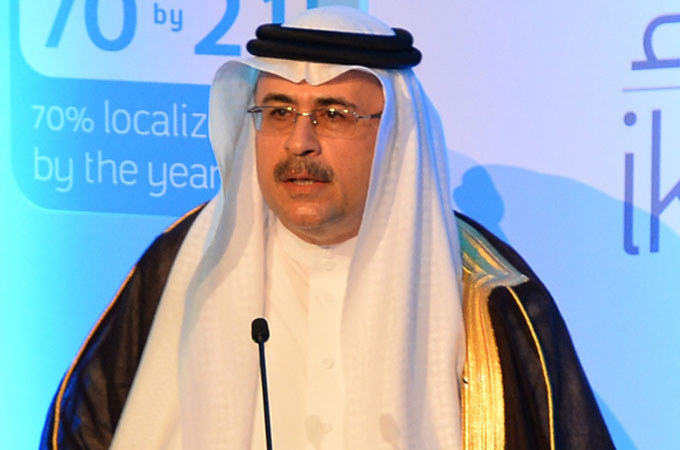Saudi Aramco is targeting more borrowing to finance growth and better leverage its balance sheet, Chief Executive Officer Amin Nasser said, as the world’s biggest oil exporter raised $5 billion in bonds this week.
The debt sale, along with $9 billion raised last year, is helping temper the impact of oil’s slide on the company’s finances. The Saudi state oil producer needs funds to plug a gap as declining free cash flow amid weaker crude prices fails to cover a massive dividend, even after the payout was reduced, a Bloomberg report said.
The move boosted net debt to the highest in almost three years and has driven up leverage ratios, but they still remain way below some of the other major oil companies.
“Our gearing today is around 5%, still one of the lowest” in the industry, Nasser said in a Bloomberg TV interview. “We will continue to tap into that additional bond markets in the future.”
The company sold dollar-denominated notes in three tranches on Tuesday, taking its issuances over the past year to $14 billion and adding to a spree of borrowings by the Saudi government and its affiliated companies. The kingdom’s debt levels jumped the most ever last quarter as it borrowed to help cover an expected budget shortfall resulting from an ambitious economic diversification plan and falling oil prices.
Aramco’s gearing ratio — a measure of its indebtedness — rose to 5.3% at the end of March from 4.5% at the end of last year. That compares with an average of 14% for international oil companies last year, Aramco said earlier this month. Shell’s gearing is 18.7% and TotalEnergies’ 14.3%.
Weaker oil resulted in Aramco’s first-quarter net income sliding 4.6% from a year earlier. Free cash flow — the money left over from operations after accounting for investments and expenses — declined 16% to $19.2 billion, and wasn’t enough to cover a reduced $21.36 billion dividend.
Some of the price pressures have deepened with crude’s nearly 12% decline since early April. Riyadh has led a push by the biggest OPEC+ producers to unwind supply cuts at a faster-than-scheduled pace, at a time when there are concerns over demand amid US President Donald Trump’s global tariff policies.
Oil jumped, trading above $66 a barrel on Thursday, after a US court deemed most of Trump’s tariffs illegal and blocked them. The administration appealed, signaling a coming legal wrangle.
Despite the uncertainty that’s whipsawed markets this year, Nasser reiterated his bullish outlook. Demand in the first quarter of this year rose by 1.7 million barrels a day and continues to expand, he said. Aramco, which has one of the world’s lowest oil extraction costs of about $3 a barrel, can sustain a period of weak prices, he said.
“The fundamentals are still strong,” Nasser said of the markets. “The tariffs had some impact on the global economy and sentiment, but, still the fundamentals are strong and we think that will continue for the foreseeable future.” -TradeArabia News Service































